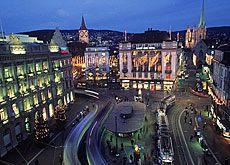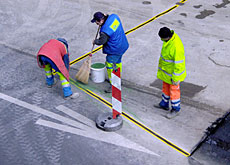Almost one in three Zurich residents is foreign

The number of foreign residents in Zurich has risen from around a fifth to almost a third of the population in the past 30 years, according to new statistics.
Germans have overtaken Italians as the biggest foreign community in Switzerland’s largest city and financial centre, with the demand for highly skilled workers increasing in recent years.
Figures compiled by Zurich city authorities reveal that 110,892 foreign people of 165 nationalities were living in the city last year, up around ten per cent in the past decade.
For the first time, the German contingent of 19,309 made up the largest group, more than doubling since 1995. In contrast, the number of Italians slipped from more than 20,000 in the mid-1990s to 14,241 in 2005.
The statistics mirror a national trend of Germans being the fastest-growing foreign legion heading across the Swiss border.
The figures do not surprise Marco Pecoraro, from the Swiss Forum for Migration and Population Studies, as Zurich has one of the biggest job markets in Switzerland.
“People come to live and work here because Switzerland offers relatively high wages and a good standard of living,” he told swissinfo.
“In the 1960s we saw a lot of Italian migration because there was a demand for low-skilled labour. But the flow changed in the 1990s to a more highly skilled job market, particularly in the financial area.
“However, the Italians are becoming more highly skilled so I expect Italian migration will grow again, but perhaps not as strongly as before.”
Pecoraro also cited language similarities that suit German migration to Zurich, and he believes the opening of borders to European Union workers in 2004 has contributed to the rise of the foreign population in general.
Variety of reasons
The study notes that foreigners are living in Zurich for a variety of reasons: for work, education, training, seeking asylum. Alternatively, they are the second or third generation of previous migrants.
It also points out that the population of Swiss nationals in the city has declined slightly in recent years.
The proportion of non-Swiss in Zurich peaked at the beginning of the First World War at just under 35 per cent, dropped to well under ten per cent during the Second World War but has been steadily rising since the 1950s.
Separate surveys released earlier this year revealed that one in five workers in Switzerland is foreign, while Swiss companies struggle to find qualified staff.
Another study showed that Germans made up 11.3 per cent of all foreign workers in Switzerland last year.
swissinfo, Matthew Allen in Zurich
Earlier this year, a Federal Statistics Office report showed that some 829,000 foreigners were working in Switzerland, which has a population of 7.4 million, in the middle of 2005.
Italians made up some 20% of these workers, people from the Balkans 19.5%, Portuguese 11.6% and Germans 11.3%.
The number of Swiss working abroad numbered 634,216 in 2005.
The 110,892 foreigners living in the city of Zurich in 2005 made up 30.2% of the total population.
Apart from Germans and Italians, the other large national groups in Zurich come from Serbia and Montenegro (13,169), Portugal (7,553), Spain (5,360) and Turkey (5,047).

In compliance with the JTI standards
More: SWI swissinfo.ch certified by the Journalism Trust Initiative




You can find an overview of ongoing debates with our journalists here. Please join us!
If you want to start a conversation about a topic raised in this article or want to report factual errors, email us at english@swissinfo.ch.